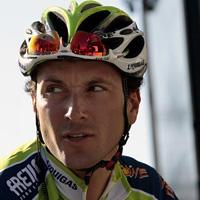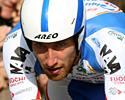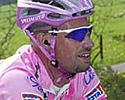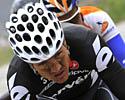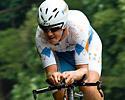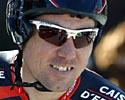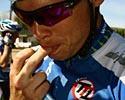Latest Cycling News, March 4, 2009Edited by Bjorn Haake Basso and Pellizotti co-captains for Giro d'ItaliaBy Gregor Brown
Ivan Basso and Franco Pellizotti will share the leadership responsibilities at Liquigas for the three-week Giro d'Italia stage race this May. Basso won his home tour in 2006, but has not raced a Grand Tour since, due to his involvement in Operación Puerto and a related two-year suspension. "We have someone in the team who has finished fourth last year, one second off of third. The first two finishers [Alberto Contador and Riccardo Riccò - ed.] are not racing, so I think Pellizotti has the right to start the Giro d'Italia as a leader," Basso said to Cyclingnews. Italy's Pellizotti held the maglia rosa of overall leader for three days in last year's Giro d'Italia. Later in the same race, he won the mountain time trial up the gravel roads of Plan de Corones. Despite the strong presence of eventual winner Alberto Contador, Pellizotti went on to finish fourth overall at 2:56 back. (For more read Leader for a year) "I am not saying that I am dropping all responsibility, but given what he has accomplished he has the right to start as a leader. Then, clearly, the road will decide who will be supported by the team." Liquigas signed Basso in April 2008, before his suspension ended six months later. He began his 2009 season with the Tour de San Luis; his latest race was the Tour of California. He had to abandon the Californian race due to a knee injury. The two riders will race together today in the Giro del Friuli. Pellizotti make his season debut in Friuli, his home region. The public will get a better view of the team dynamics when the two race together at the Tirreno-Adriatico next week, March 11 to 17. "The public's opinion and what it expects is another discussion. I am not saying I will not be in optimum form for the Giro, but you have to give respect to those who have worked hard in the last two years. It is not a new concept: I have shared responsibility in my old teams, with Carlos Sastre at CSC for example." The Giro del Friuli, 184.2 kilometres, consists of a circuit that starts and ends in Pordenone. The Caneva Castle climb in each circuit will break up the race, but the finale is flat. The race was last held in 2004, when Pellizotti finished runner up to De Nardi's Michele Gobbi. Dekker scouting out Milano-SanremoSilence-Lotto rider Thomas Dekker scouts out Milano-Sanremo today, along with his teammates Jürgen Roelandts and Greg van Avermaet. The trio will especially look at the climbs of the Cipressa and the Poggio. The race is on March 21. It is the backside of the two famous rises shortly before the finish in Sanremo that the three will be particularly interested in. "Getting to know the descent is especially important," sports director Roberto Damiani told Dutch paper De Telegraaf. Silence-Lotto had a mixed opening weekend in Belgium. Greg van Avermaet finished fourth in the Omloop Het Nieuwsblad on Saturday. In that race, Philippe Gilbert was also riding well. But Roelandts faced some criticism after his 61st place in Kuurne-Brussel-Kuurne. Roelandts, the reigning Belgian champion is the team leader for some of the Spring Classics that Gilbert and Van Avermaet are not racing. Fresh face Ginanni to challenge Sanremo's veteransBy Gregor Brown
Francesco Ginanni, 23, will be one of the favourites to battle the experts in Milano-Sanremo this March 21. The second-year professional of team Diquigiovanni-Androni has already won two key races this year over the likes of 2006 Sanremo winner Filippo Pozzato and World Champion Alessandro Ballan. "For an Italian Milano-Sanremo is the World Championships of the spring," Ginanni said to Cyclingnews from his home in Casalguidi, Italy. Gianni won three Italian one-day classics last fall – Giro del Veneto, Tre Valli Varesine and GP Carnaghese – to put his name on the top of the sports newspapers. He started the 2009 season just as strong as he ended last year with a win in the Trofeo Laigueglia (won by Lance Armstrong in 1993 at age 21) and in last weekend's GP Insubria. His name now comes up as one of the riders to challenge the likes of Pozzato, Ballan, Robbie McEwen, Alessandro Petacchi and Mark Cavendish in Milano-Sanremo. The race is one of sport's longest single-day events at 298 kilometres and is one of the five Monuments of cycling. "A lot changes at that distance; you feel it in the legs – the stress and the fatigue of the race. Last year was the first time I did a race that long." Ginanni is the strongest of several young sprinters coming through the Italian ranks that could challenge for the magical Sanremo win. Others include teammate Mattia Gavazzi, Jacopo Guarnieri (Liquigas), Oscar Gatto (ISD), Michele Merlo (Barloworld) and Enrico Rossi (Ceramica Flaminia-Bossini Docce). Ginanni's advantage is that he rides for one of most successful teams at this point in the season. Gianni Savio's Diquigiovanni has won 14 times so far in 2009. "Certainly, I will not be alone in the finale. There will be Davide Rebellin, Michele Scarponi – we will be able to vie for the win. If it arrives in a sprint I will have two optimum domestiques at my disposal." Gianni will race the traditional Milano-Sanremo warm up event, Tirreno-Adriatico, next week. The Italian stage race runs from March 11 to 17 and leaves three days until the start of La Classicissima. WADA ready to close doping loophole
The World anti-doping agency (WADA) is revising its policy to include re-testing samples that had previously come back as negative but remained suspicious. The new guidelines will allow re-testing of previously frozen samples. "There could be interesting cases to come," Olivier Rabin, WADA's science director, told The Associated Press. It is the kind of scenario that German Stefan Schumacher is at odds with against the French anti-doping agency (AFLD). Schumacher's initial A-sample tested negative, but the values were suspicious enough that AFLD re-tested it for CERA, a newer generation of EPO. Those tests came back positive. Schumacher is fighting the suspension on the grounds that the A-sample had been shipped between various entities, unsealed and with his name written on it, a violation of anti-doping regulation. If WADA comes up with such a system they will have to make sure the handling of the samples is bullet-proof. WADA also faces problems from copies of drugs, called biosimilars, which are different enough from the original medicine that they may not be testing positive. There are around 20 countries world-wide which produce such EPO biosimilars. Approximately 80 such products are suspected to be in production, according to WADA-funded research by experts Iain Macdougall and Michael Ashenden. The changes are still revised currently, but are expected to be approved by the WADA executive committee on May 9. Rasmus Damsgaard, a Danish anti-doping expert who works for some cycling teams as well as the International Ski Federation, acknowledged the problem of finding EPO copies. He is suspecting that five cross-country skiers whose tests came back negative from a WADA-accredited lab in Europe last year were using such a product. Damsgaard also believes that word spread among athletes that EPO copies were slipping past controls. The revisions now planned by WADA, he added, will mark "a milestone in the EPO test. A lot of people came through the loophole," he said. Race motos to face suspension
The Belgian cycling federation (KBWB) is thinking about suspending race motorbikes who disobey instructions. Suspensions would last one week. The announcement came following new problems in the Omloop Het Nieuwsblad. Technical director Jos Smets blamed a lack of respect on the side motorbikers. "There are clear announcements. People who can't listen will have to feel the consequences," Smets told Sportwereld. Rabobank Directeur Sportif Erik Dekker was complaining about Saturday's race when Philippe Gilbert, Nick Nuyens and Frédéric Amorison attacked to try to reach the front duo of Sebastian Langeveld and Heinrich Haussler. "There was a pack of motorbikes ahead of the trio and the three gained 30 seconds in just two kilometres!" Smets acknowledged the problem. "In the given scenario we have the guidelines that there should be no motorbike within 100 metres ahead of the riders. A motorbike is not supposed to be between groups if the gap is less than 15 seconds. This rule was not respected by everyone during the Omloop." The federation held a meeting with Sportspress, a union of sports journalists, yesterday. "I want to clarify it was not just photographers who were at fault. Also people from VRT [television crew - ed.], from the organisation and from the race direction were in the way sometimes," Smets said. "We want to check if that many cars are really necessary in the race." Photographers may be required to work in pools in the future. This would limit their numbers in small and dangerous places and the pictures would have to be shared with their colleagues. Duggan: Never walking alone
Reams of news print have been spent on the return of Lance Armstrong, although there's another pro rider quietly making his return to the paid ranks. He's also American, and like Armstrong, plies his trade clad in pale blue. Garmin-Slipstream's Tim Duggan's comeback is very different to his countryman's as Cyclingnews' Les Clarke discovers. It's tough returning to the bike after an accident. From distant muscle memory in the legs to the mental aspect of confronting the 'demons' of the road, getting back in the saddle is no easy task. If that crash meant suffering potentially life-threatening consequences it's even more difficult, as Tim Duggan found out. A crash on a descent during stage three of last year's Tour de Georgia left one of Garmin-Slipstream's 'foundation riders' in a critical state in hospital. A broken collarbone and scapula were the outward indication that he had fallen, although according to the 26-year-old there was a more sinister effect of the impact that occurred at around 80km/h. "I was on the cusp of having brain surgery where they'd have to go in and relieve some of the pressure [on my brain]," says Duggan. "I was on the redline for that over a couple of days... luckily they never had to do that, it went down on its own. He adds that the recovery was, "Just a case of a lot of time, a lot of rest and a lot of cognitive and psychological rehab." Read the full interview with Tim Duggan. Arroyo with Rudy Project glasses
David Arroyo (Caisse d'Epargne) has signed a one-year contract with Italian sports glasses manufacturer Rudy Project. Rudy Project has supplied athletes with glasses for more than 20 years. Arroyo chose two models that he will wear, SportMask Performance and Noyz Racing. The company was established in Treviso in 1985 and has focused mainly on cycling. Teams like Milram or riders like Ivan Basso are among the clientele. Team Type 1 announces internal anti-doping testing programme
Team Type 1 announced today that it has launched its first anti-doping testing programme. The world's only professional cycling team that includes riders who have Type 1 diabetes administered blood and urine tests to its riders at training camp in Buellton, California, in late January. The samples were tested and analysed by Scott Analytics Inc., an independent anti-doping test agency in Pasadena, California. Scott Analytics is headed up by respected anti-doping researcher Paul Scott. He has previously served as Director of Clients at the UCLA Olympic Analytical Laboratory and Chief Scientific Officer and Chief Operating Officer of the Agency for Cycling Ethics, Inc. Throughout the season, every athlete on the Team Type 1 men's and women's professional teams will be periodically tested in random controls – in addition to their participation in in-competition and out-of-competition tests administered by the United States Anti-Doping Agency (USADA) and the World Anti-Doping Agency (WADA). Team Type 1 founder and second-year professional Phil Southerland said the new programme is an integral part of the team's core belief in fair play. "The riders on Team Type 1 who have Type 1 diabetes – myself included – have to use insulin, not for racing, but to stay alive," Southerland said. Team Type 1's Dr. Michael Roshon will supervise the programme. Roshon said three criteria were used for its inception: It had to be as effective as the biological passport programme utilised by the International Cycling Union (UCI); it had to be independent, and it had to be within the scope of the team's budget. "Our goal was to take those three criteria and come up with a programme that is effective at detecting and deterring the use of performance enhancing substances," Roshon said. Scott said Team Type 1's programme marks a revolutionary step in the realm of anti-doping programmes. "Unlike other internal anti-doping programmes – including ones I previously designed – this one will offer what the UCI requires of ProTour teams at a fraction of the cost," he said. "This is a complete programme on a budget affordable to most U.S. or European continental teams." (All rights reserved/Copyright Future Publishing (Overseas) Limited 2009) |

|
January 2009 |
Recently on Cyclingnews.com |

